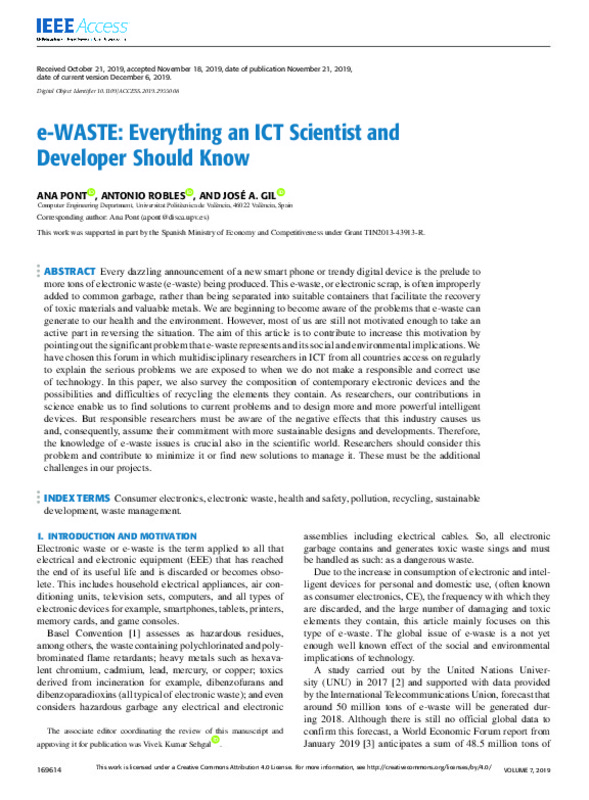JavaScript is disabled for your browser. Some features of this site may not work without it.
Buscar en RiuNet
Listar
Mi cuenta
Estadísticas
Ayuda RiuNet
Admin. UPV
e-WASTE: Everything an ICT Scientist and Developer Should Know
Mostrar el registro sencillo del ítem
Ficheros en el ítem
| dc.contributor.author | Pont Sanjuan, Ana
|
es_ES |
| dc.contributor.author | Robles Martínez, Antonio
|
es_ES |
| dc.contributor.author | Gil, José A.
|
es_ES |
| dc.date.accessioned | 2020-01-18T21:01:21Z | |
| dc.date.available | 2020-01-18T21:01:21Z | |
| dc.date.issued | 2019 | es_ES |
| dc.identifier.uri | http://hdl.handle.net/10251/135019 | |
| dc.description.abstract | [EN] Every dazzling announcement of a new smart phone or trendy digital device is the prelude to more tons of electronic waste (e-waste) being produced. This e-waste, or electronic scrap, is often improperly added to common garbage, rather than being separated into suitable containers that facilitate the recovery of toxic materials and valuable metals. We are beginning to become aware of the problems that e-waste can generate to our health and the environment. However, most of us are still not motivated enough to take an active part in reversing the situation. The aim of this article is to contribute to increase this motivation by pointing out the significant problem that e-waste represents and its social and environmental implications. We have chosen this forum in which multidisciplinary researchers in ICT from all countries access on regularly to explain the serious problems we are exposed to when we do not make a responsible and correct use of technology. In this paper, we also survey the composition of contemporary electronic devices and the possibilities and difficulties of recycling the elements they contain. As researchers, our contributions in science enable us to find solutions to current problems and to design more and more powerful intelligent devices. But responsible researchers must be aware of the negative effects that this industry causes us and, consequently, assume their commitment with more sustainable designs and developments. Therefore, the knowledge of e-waste issues is crucial also in the scientific world. Researchers should consider this problem and contribute to minimize it or find new solutions to manage it. These must be the additional challenges in our projects. | es_ES |
| dc.description.sponsorship | This work was supported in part by the Spanish Ministry of Economy and Competitiveness under Grant TIN2013-43913-R. | es_ES |
| dc.language | Inglés | es_ES |
| dc.publisher | Institute of Electrical and Electronics Engineers | es_ES |
| dc.relation.ispartof | IEEE Access | es_ES |
| dc.rights | Reconocimiento (by) | es_ES |
| dc.subject | Consumer electronics | es_ES |
| dc.subject | Electronic waste | es_ES |
| dc.subject | Health and safety | es_ES |
| dc.subject | Pollution | es_ES |
| dc.subject | Recycling | es_ES |
| dc.subject | Sustainable development | es_ES |
| dc.subject | Waste management | es_ES |
| dc.subject.classification | ARQUITECTURA Y TECNOLOGIA DE COMPUTADORES | es_ES |
| dc.title | e-WASTE: Everything an ICT Scientist and Developer Should Know | es_ES |
| dc.type | Artículo | es_ES |
| dc.identifier.doi | 10.1109/ACCESS.2019.2955008 | es_ES |
| dc.relation.projectID | info:eu-repo/grantAgreement/MINECO//TIN2013-43913-R/ES/EFICIENCIA ECONOMICA EN LA PLANIFICACION Y USO DE INFRAESTRUCTURAS CLOUD/ | es_ES |
| dc.rights.accessRights | Abierto | es_ES |
| dc.contributor.affiliation | Universitat Politècnica de València. Departamento de Informática de Sistemas y Computadores - Departament d'Informàtica de Sistemes i Computadors | es_ES |
| dc.description.bibliographicCitation | Pont Sanjuan, A.; Robles Martínez, A.; Gil, JA. (2019). e-WASTE: Everything an ICT Scientist and Developer Should Know. IEEE Access. 7:169614-169635. https://doi.org/10.1109/ACCESS.2019.2955008 | es_ES |
| dc.description.accrualMethod | S | es_ES |
| dc.relation.publisherversion | https://doi.org/10.1109/ACCESS.2019.2955008 | es_ES |
| dc.description.upvformatpinicio | 169614 | es_ES |
| dc.description.upvformatpfin | 169635 | es_ES |
| dc.type.version | info:eu-repo/semantics/publishedVersion | es_ES |
| dc.description.volume | 7 | es_ES |
| dc.identifier.eissn | 2169-3536 | es_ES |
| dc.relation.pasarela | S\398613 | es_ES |
| dc.contributor.funder | Ministerio de Economía y Competitividad | es_ES |
| dc.subject.ods | 08.- Fomentar el crecimiento económico sostenido, inclusivo y sostenible, el empleo pleno y productivo, y el trabajo decente para todos | es_ES |
| dc.subject.ods | 03.- Garantizar una vida saludable y promover el bienestar para todos y todas en todas las edades | es_ES |
| dc.subject.ods | 12.- Garantizar las pautas de consumo y de producción sostenibles | es_ES |
| dc.subject.ods | 09.- Desarrollar infraestructuras resilientes, promover la industrialización inclusiva y sostenible, y fomentar la innovación | es_ES |








